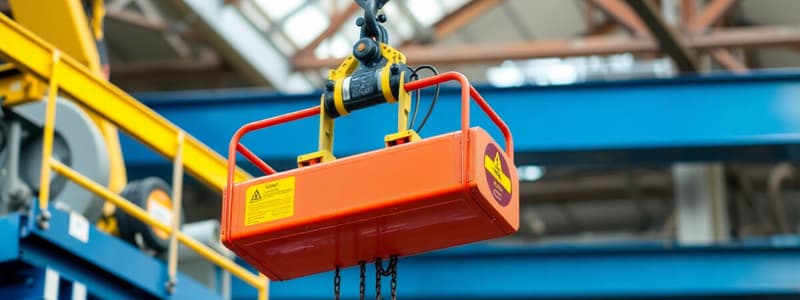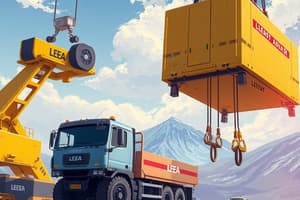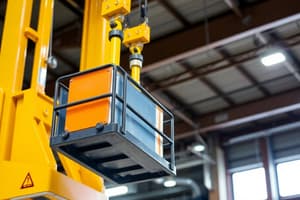Podcast
Questions and Answers
Which of the following is NOT considered a lifting appliance?
Which of the following is NOT considered a lifting appliance?
- Lifts (correct)
- Jacks
- Cranes
- Hoists
Who is regarded as a manufacturer of lifting equipment?
Who is regarded as a manufacturer of lifting equipment?
- A person who places the equipment into service
- A person who sells the equipment
- A user who operates the equipment
- A designer or manufacturer responsible for compliance (correct)
What is a manufacturer's certificate also known as?
What is a manufacturer's certificate also known as?
- Birth certificate (correct)
- Quality assurance certificate
- Registration document
- Compliance document
What information does a manufacturer's certificate typically include?
What information does a manufacturer's certificate typically include?
What happens when a duty holder delegates their obligations?
What happens when a duty holder delegates their obligations?
What role does the manufacturer have regarding the conformity of lifting equipment?
What role does the manufacturer have regarding the conformity of lifting equipment?
Which document verifies that necessary manufacturing tests have been carried out?
Which document verifies that necessary manufacturing tests have been carried out?
Which of the following is NOT a responsibility of a duty holder?
Which of the following is NOT a responsibility of a duty holder?
Who has ultimate responsibility for the health and safety of users of lifting equipment?
Who has ultimate responsibility for the health and safety of users of lifting equipment?
What should be retained as part of the lifting equipment records?
What should be retained as part of the lifting equipment records?
What must a duty holder ensure about the tasked employees?
What must a duty holder ensure about the tasked employees?
In the absence of a defined manufacturer, who is considered the manufacturer?
In the absence of a defined manufacturer, who is considered the manufacturer?
What type of obligations do importers and distributors have?
What type of obligations do importers and distributors have?
What is a key factor that manufacturers must ensure?
What is a key factor that manufacturers must ensure?
Which aspect is crucial for the end-user according to the legislation?
Which aspect is crucial for the end-user according to the legislation?
What must manufacturers provide to the end-user?
What must manufacturers provide to the end-user?
What is the primary purpose of the Foundation Certificate (Global) training course?
What is the primary purpose of the Foundation Certificate (Global) training course?
Who bears the primary responsibility for health and safety at work according to health and safety law?
Who bears the primary responsibility for health and safety at work according to health and safety law?
What must be completed before accessing LEEA's Diploma qualifications?
What must be completed before accessing LEEA's Diploma qualifications?
What is considered the 'moral duty of care' in the context of health and safety?
What is considered the 'moral duty of care' in the context of health and safety?
Which of the following is NOT a core area covered in the Foundation Certificate course?
Which of the following is NOT a core area covered in the Foundation Certificate course?
Which aspect of lifting equipment does the Foundation Certificate course emphasize?
Which aspect of lifting equipment does the Foundation Certificate course emphasize?
What is the role of legislation in the lifting equipment industry?
What is the role of legislation in the lifting equipment industry?
What is a potential consequence for employers who do not manage health and safety adequately?
What is a potential consequence for employers who do not manage health and safety adequately?
Which of the following best describes a key focus on controlling risks in the context of lifting equipment?
Which of the following best describes a key focus on controlling risks in the context of lifting equipment?
Which of the following is NOT listed as a potential financial consequence of poor health and safety management?
Which of the following is NOT listed as a potential financial consequence of poor health and safety management?
What is the primary legislation for health and safety in the UK?
What is the primary legislation for health and safety in the UK?
Which of the following best describes the role of legislation in health and safety?
Which of the following best describes the role of legislation in health and safety?
Which act in the USA serves as the primary legislation for health and safety?
Which act in the USA serves as the primary legislation for health and safety?
What impact does unsafe working conditions typically have on production?
What impact does unsafe working conditions typically have on production?
What does the model WHS Act in Australia represent?
What does the model WHS Act in Australia represent?
Which of the following could NOT be considered a societal expectation of businesses regarding health and safety?
Which of the following could NOT be considered a societal expectation of businesses regarding health and safety?
What is the primary purpose of Approved Codes of Practice (ACoPs)?
What is the primary purpose of Approved Codes of Practice (ACoPs)?
Who is responsible for issuing Approved Codes of Practice (ACoPs)?
Who is responsible for issuing Approved Codes of Practice (ACoPs)?
What is a consequence of contravening the advice provided in a Code of Practice?
What is a consequence of contravening the advice provided in a Code of Practice?
Which of the following is NOT a type of Code of Practice mentioned?
Which of the following is NOT a type of Code of Practice mentioned?
What is meant by the term 'Duty Holder'?
What is meant by the term 'Duty Holder'?
What is true about ACoPs in relation to statute law?
What is true about ACoPs in relation to statute law?
Which of the following best describes a Recommended Code of Practice (RCoP)?
Which of the following best describes a Recommended Code of Practice (RCoP)?
Why is working in a safe environment with tested equipment emphasized in the industry?
Why is working in a safe environment with tested equipment emphasized in the industry?
What is the purpose of a thorough examination of lifting equipment?
What is the purpose of a thorough examination of lifting equipment?
Who is responsible for carrying out the thorough examination of lifting equipment?
Who is responsible for carrying out the thorough examination of lifting equipment?
Which of the following best describes lifting accessories?
Which of the following best describes lifting accessories?
Why is it essential to have an inspection regime for lifting accessories?
Why is it essential to have an inspection regime for lifting accessories?
What defines a lifting appliance?
What defines a lifting appliance?
What is a common misconception about regular inspections of lifting equipment?
What is a common misconception about regular inspections of lifting equipment?
Which statement about lifting accessories is accurate?
Which statement about lifting accessories is accurate?
What is the main reason for thoroughly inspecting lifting equipment?
What is the main reason for thoroughly inspecting lifting equipment?
Flashcards
Approved Code of Practice (ACoP)
Approved Code of Practice (ACoP)
A document explaining how to meet legal requirements, issued by relevant authorities.
Recommended Code of Practice (RCoP)
Recommended Code of Practice (RCoP)
A code of practice that provides guidelines but isn't legally required to follow.
Code of Practice
Code of Practice
Guidelines on how to meet legal requirements.
Duty Holder
Duty Holder
Signup and view all the flashcards
Regulations
Regulations
Signup and view all the flashcards
ACoP significance
ACoP significance
Signup and view all the flashcards
Technical publications
Technical publications
Signup and view all the flashcards
Safety information sheets
Safety information sheets
Signup and view all the flashcards
Foundation Certificate
Foundation Certificate
Signup and view all the flashcards
Legislation & Regulations (Lifting)
Legislation & Regulations (Lifting)
Signup and view all the flashcards
Employer Responsibility (Health & Safety)
Employer Responsibility (Health & Safety)
Signup and view all the flashcards
Employee Responsibility (Health & Safety)
Employee Responsibility (Health & Safety)
Signup and view all the flashcards
Lifting Equipment
Lifting Equipment
Signup and view all the flashcards
Legal Frameworks
Legal Frameworks
Signup and view all the flashcards
Moral Duty of Care
Moral Duty of Care
Signup and view all the flashcards
Health and Safety Law
Health and Safety Law
Signup and view all the flashcards
Impact of Unsafe Work
Impact of Unsafe Work
Signup and view all the flashcards
Health and Safety Culture
Health and Safety Culture
Signup and view all the flashcards
Negative PR for Safety
Negative PR for Safety
Signup and view all the flashcards
Financial Costs of Safety Issues
Financial Costs of Safety Issues
Signup and view all the flashcards
Legislation
Legislation
Signup and view all the flashcards
Global Safety Requirements
Global Safety Requirements
Signup and view all the flashcards
Delegation of Responsibility
Delegation of Responsibility
Signup and view all the flashcards
Competency in Delegation
Competency in Delegation
Signup and view all the flashcards
Employer Responsibility (Lifting)
Employer Responsibility (Lifting)
Signup and view all the flashcards
Employee Responsibility (Lifting)
Employee Responsibility (Lifting)
Signup and view all the flashcards
Manufacturer Responsibility (Lifting)
Manufacturer Responsibility (Lifting)
Signup and view all the flashcards
Importer/Distributor Responsibility (Lifting)
Importer/Distributor Responsibility (Lifting)
Signup and view all the flashcards
Safety Information for End-Users
Safety Information for End-Users
Signup and view all the flashcards
Foreseeable Hazards (Lifting)
Foreseeable Hazards (Lifting)
Signup and view all the flashcards
Thorough Examination
Thorough Examination
Signup and view all the flashcards
Competent Person
Competent Person
Signup and view all the flashcards
Lifting Accessory
Lifting Accessory
Signup and view all the flashcards
Lifting Appliance
Lifting Appliance
Signup and view all the flashcards
Inspection Regime
Inspection Regime
Signup and view all the flashcards
Safety
Safety
Signup and view all the flashcards
Why Inspect Lifting Equipment?
Why Inspect Lifting Equipment?
Signup and view all the flashcards
Manufacturer (Lifting Equipment)
Manufacturer (Lifting Equipment)
Signup and view all the flashcards
Manufacturer's Certificate
Manufacturer's Certificate
Signup and view all the flashcards
Working Load Limit (WLL)
Working Load Limit (WLL)
Signup and view all the flashcards
Statement of Conformity
Statement of Conformity
Signup and view all the flashcards
Placement on the Market
Placement on the Market
Signup and view all the flashcards
Legal Requirements (Lifting)
Legal Requirements (Lifting)
Signup and view all the flashcards
Study Notes
Foundation Certificate (FOU) (Global) Workbook
- This course provides essential knowledge for students pursuing Diploma qualifications in lifting equipment
- Core areas covered include legislation, regulations, standards, best practice relating to lifting equipment, definitions, controlling risks, material science, units of measure, basic machines, manufacturers' verification, rating of lifting equipment, and types of lifting equipment
- Successful completion allows students to outline legislative requirements, choose appropriate standards and best practices for lifting equipment use, identify different lifting equipment, describe manufacturing materials and methods, and understand manufacturers' verification processes.
Legislation and Regulations
- Legal frameworks govern and regulate decision-making, agreements, and laws within the lifting equipment industry
- Employers have primary responsibility for health and safety at work, yet employees also hold responsibilities
- Employers have a moral duty of care to ensure appropriate working conditions
- Consequences of inadequate health and safety management for employers include unsafe working conditions, loss of production, loss of sales turnover and profitability, negative public relations, fines, damages, legal costs, and insurance.
Standards
- Standards are published specifications that set common languages and technical criteria for goods and services, increasing reliability and efficiency
- Standards are designed for voluntary use and often have quasi-legal status due to widespread recognition of conformity
- ISO standards are international, BSI standards are British, and ASME standards are American
- Standards are created by committees of subject matter experts through a discussion, draft, comments stage, and then publication process
Codes of Practice (ACoPs)
- ACoPs are sets of rules that explain how people should behave in a specific profession or group of professionals
- ACoPs, unlike regulations, describe methods to comply with legal requirements
- ACoPs are issued by relevant authorities after consulting stakeholders, such as trade associations, and often complement health and safety regulations
- ACoPs, although not legally binding, can be used as evidence in a legal proceeding to demonstrate non-compliance with regulations
Duty Holder
- The term "duty holder" encompasses all modern working arrangements
- The duty holder possesses the ultimate responsibility for the lifting equipment they use (often employers or self-employed personnel)
- However, the duty holder might delegate certain responsibilities to suitably qualified personnel
- Delegation does not discharge the duty holder from overall responsibility; instead, it alters the nature of that accountability
- Duty holders must ensure that delegated tasks are handled by competent, qualified, experienced, and appropriately trained personnel
Competency
- Competency encompasses experience, appropriate qualifications, continuous professional development, knowledge and understanding of related laws, access to related information, ability to work, physical fitness for the required environment, professional morals and ethics, and specific subject matter expertise
Factor of Safety (FOS)
- Factor of Safety is a working coefficient that adds redundancy to strength of components to account for accidental overload and deterioration over time
Studying That Suits You
Use AI to generate personalized quizzes and flashcards to suit your learning preferences.




